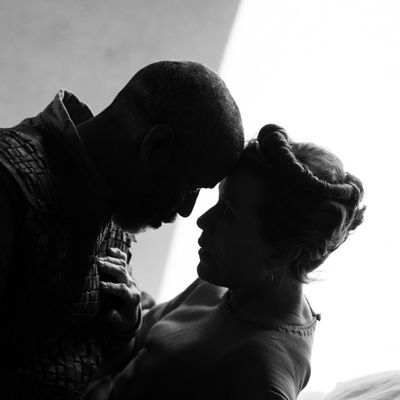
Before The Tragedy of Macbeth opened this year’s New York Film Festival, director Joel Coen confessed that the cast and crew had gone into the Shakespeare adaptation scornful of the old superstition that mentioning the play by name would bring on disaster. Then March 13, 2020, arrived, and their production ground to a halt alongside much of the world’s activity, and by the time shooting started up again, everyone was assiduously referring to what they were making as The Tragedy and to the characters played by Denzel Washington and Frances McDormand as “the Thane of Cawdor and his wife.” The Scottish curse, it seems, isn’t unique to the stage, or maybe The Tragedy of Macbeth was susceptible because of how it evokes that stage, shot in black-and-white on stark interior sets that are more like the idea of a castle, or a road, or a misty field, than actual places. It’s not a filmed play, but it does feel like it takes place in some infernal theater of the soul where the original work has been reduced to its bleached bones in an attempt to find its essence.
The film finds something — an essence, let’s say — though it also feels intractably like an exercise, a chance for its blue-chip talent to flex muscles they haven’t had a chance to use for a while, more than it does a complete work unto itself. Its most provocative gambit, aside from giving a too-brief showcase to the astounding Kathryn Hunter, is to ground its story later in life. Washington and McDormand are both in their 60s, older than has been typical for actors in the roles of Macbeth and Lady Macbeth, and their presence gives new dimension to the characters’ ruthless actions. Childless and with no chance of establishing a legacy of any sort, Macbeth murders his way to the throne of Scotland out of what feels much more openly like nihilism than ambition, as though he’s looked ahead toward a dwindling future promising few surprises and chosen violence instead. The Macbeth of the film barely needs the prophecies of the witches to push him toward regicide.
Hell, he doesn’t even really require much from his wife’s goading, which is helpful, given how much better Washington fares with the material than McDormand. While McDormand wars with the writing, sometimes barking phrases as though playing to the back of the house and other times trying to work around it with gestures and outsize expressions, Washington manages the near-impossible feat of delivering his lines as though he’s putting the words together in the moment, speaking some of the most famous sentences in the English language as though they’re actually being dredged up out of Macbeth’s roiling consciousness. When he kills King Duncan (Brendan Gleeson) under his own roof, coming to the man in the night and stabbing him in bed, the haunted stillness on his face attests to a man arriving at a new understanding of his own dark capabilities. Washington’s Macbeth doesn’t seem to relish the power he accrues; his bloody climb up the ladder seems more like a desperate attempt to find meaning in a life that’s closer to its end than its beginning.
The gulf between what Washington is doing and what McDormand is matters less than you might think given how trimmed down the play is. At 105 minutes, The Tragedy of Macbeth accords almost as many important encounters to Macbeth and the witches as to Macbeth and his spouse. The two scenes with the witches are more illuminating, anyway. Hunter, a British actor best known for her work onstage, plays all three of the weird sisters as well as the old man that exposition handler Ross (Alex Hassell) encounters on the road. Emerging, croaking and genderless, lips cracked and limbs bending impossibly, Hunter appears as unsettlingly alien as Bengt Ekerot was as Death in The Seventh Seal. When she and Washington have an initial encounter on the heath and then another by a conjured-up pool in Macbeth’s compound, it becomes clear that they are in some ways of a kind.
Hunter’s virtuoso performance highlights something in Washington’s own towering turn — that it hinges on the idea that something demonic has always been lurking inside the Scottish lord behind the dazzling smile and the careworn expression. The pair are good enough that the movie almost seems like it could be pared down even further until it was just Macbeth and the witch, enacting this cycle in another of the purgatories that the Coen brothers have always specialized in. While The Tragedy of Macbeth is Joel Coen’s first solo directing effort — Ethan having taken a maybe-permanent break from film to focus on theater — that aspect of their long collaboration remains steady. Macbeth becomes, like so many of the Coens’ protagonists, a character trapped in his own fixations and failings, the concave world onscreen a reflection of the self he can’t escape.


